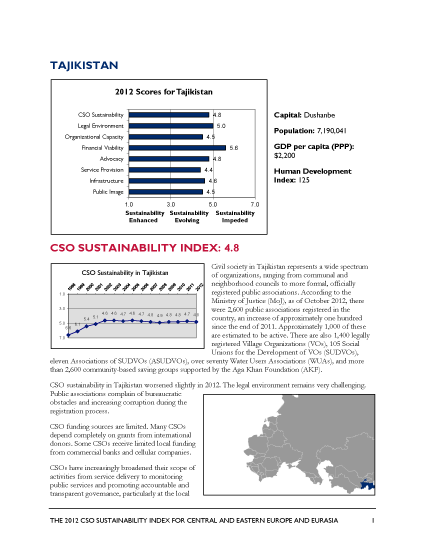CSO SUSTAINABILITY INDEX: 4.8
Civil society in Tajikistan represents a wide spectrum of organizations, ranging from communal and neighborhood councils to more formal, officially registered public associations. According to the Ministry of Justice (MoJ), as of October 2012, there were 2,600 public associations registered in the country, an increase of approximately one hundred since the end of 2011. Approximately 1,000 of these are estimated to be active. There are also 1,400 legally registered Village Organizations (VOs), 105 Social Unions for the Development of VOs (SUDVOs), eleven Associations of SUDVOs (ASUDVOs), over seventy Water Users Associations (WUAs), and more than 2,600 community-based saving groups supported by the Aga Khan Foundation (AKF).
CSO sustainability in Tajikistan worsened slightly in 2012. The legal environment remains very challenging. Public associations complain of bureaucratic obstacles and increasing corruption during the registration process. CSO funding sources are limited. Many CSOs depend completely on grants from international donors. Some CSOs receive limited local funding from commercial banks and cellular companies.
CSOs have increasingly broadened their scope of activities from service delivery to monitoring public services and promoting accountable and transparent governance, particularly at the local level. Large organizations and coalitions have greater advocacy and lobbying capacities than smaller and rural CSOs, which lack the necessary tools, resources, and capacities to engage in lobbying efforts.
Rural communities only have vague ideas of the role CSOs play in society. In urban areas, the public perceives CSOs as grant-dependent and donor-driven primarily because of CSOs’ lack of transparency and accountability. Businesses generally do not understand the benefits of cooperating with CSOs.








Comment
Make a general inquiry or suggest an improvement.